Better with business
How alumni boosted career success by complementing their passion with an MBA
By Matthew Biddle
In a typical UB MBA course, you’ll find a diverse mix of students from across the country and around the globe. With their unique perspectives and backgrounds, School of Management students push one another to think bigger, take risks and drive change.
A key part of the rich UB MBA experience is the diversity of thought that comes, in part, from the school’s array of collaborative MBA programs, which allow students to master the business of their business, to complement their passion with a management degree and improve their marketability.
Some of these programs—including the MD/MBA, JD/MBA and PharmD/MBA options—are longstanding, with a wealth of alumni who attest to the value of adding the leadership, problem-solving and team skills an MBA provides to the focused knowledge and technical expertise they developed elsewhere at UB.
Other collaborative MBA programs are new, driven by increased demand from students and employers. The MBA/MS in Real Estate Development program saw its first graduate, Lindsay Macaluso, in 2018, and the MBA/Master of Education program was launched this fall to train future higher education administrators and advocates.
Today, the school offers 19 collaborative MBA programs (see sidebar). On average, engineering students make up about 15% of the MBA class, while health care-focused dual-degree students represent another 15%. The six School of Management alumni featured here represent a sample of the UB MBA graduates who deploy their skills and experience in management and another field to make an impact every day—on their industry, community and the world at large.
The Upstart Developer
Lindsay Macaluso, MSRED/MBA ’18
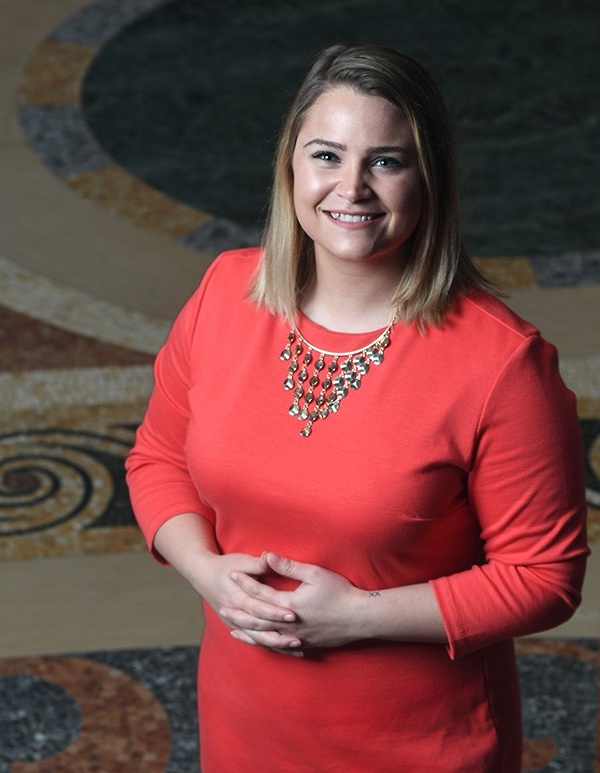
Photo: Nancy J. Parisi
Lindsay Macaluso's to-do list is full.
As a commercial mortgage analyst at Largo Capital, she works on everything from small local hotels to a $150 million condo conversion in Vancouver involving complex, cross-border financing. Right now, her portfolio includes projects in California, New York, Detroit, downtown Chicago and several beachfront cities in Florida. On top of that, she’s also helping the firm open three new offices, simultaneously managing the nuances of individual deals and working with the C-Suite to advance the company’s growth strategy.
“Real estate can be a vehicle to do great things, shaping how we engage with the world and one another,” says Macaluso, who was the first graduate of the School of Management’s collaborative MBA and MS in Real Estate Development program. “My mission is to create opportunity and drive economic development through real estate. Ultimately, I would love the freedom to own my own property, so I can pursue other creative projects.”
One such project is MemoryFox, the startup she developed as a student with Chris Miano, MBA ’17. After taking advantage of UB’s entrepreneurial ecosystem—including Blackstone LaunchPad and the Panasci Technology Entrepreneurship Competition—they launched the platform to collect and share family history and were recognized at the 2016 Forbes Under 30 Summit. Since then, MemoryFox has pivoted to become a marketing platform that helps nonprofits tell their stories, and Macaluso stays involved in business development.
“At its core, this was a passion project, something I saw a need for even in my own family as stories were lost over time,” she says. “MemoryFox keeps that spirit of storytelling alive and gives us the opportunity to engage with some really cool organizations.”
Whether she’s closing multimillion-dollar deals or pitching investors, Macaluso says she constantly combines the skills she gained at UB.
“Understanding capital markets from both the MBA and real estate sides was critical,” she says. “Above all, my dual degrees grant agility: I can deploy the technical skills and industry expertise gleaned from the real estate program alongside the strategic orientation and global mindset I cultivated in the MBA program.”
The Medicine Man
Peter Fendt, PharmD/MBA ’16
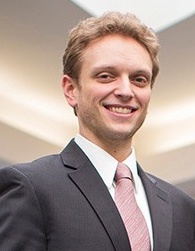
Photo: Tom Wolf
In the pharmaceutical industry, everything is about the patient. For Peter Fendt, it was the experiences of his family and friends who were affected by disease that inspired him to find opportunities to impact the development of new medicines.
“Through personal experiences, and speaking with individuals in the pharmaceutical industry, I was motivated to pursue a career where I could help patients on a global scale and address medical conditions where patients do not currently have sufficient therapeutic options available to them,” he says.
After graduating from UB’s PharmD/MBA program, Fendt completed a postdoc fellowship through Rutgers University and went to work for Celgene, a global biopharmaceutical company. Today, he serves as senior manager of global market insights, monitoring industry competitors, data readouts and the progress of on-going clinical trials, particularly for multiple myeloma therapies.
Recently, he has taken the lead on a global market research plan for a new cancer therapy that’s under development and being prepared for commercialization, requiring him to collaborate with partners worldwide, gather perspectives from physicians, caregivers and patients, and draw on his dual skill sets.
“One of the most valuable things about the dual PharmD/MBA program at UB is how the experiences complement each other,” Fendt says. “The MBA taught me how to apply technical knowledge and cross-functional teamwork in the commercial side of the business, while pharmacy practice helped me understand how treatments impact patients on an emotional level. Maintaining that patient focus, and not looking at the science in isolation, is critical.”
In the future, Fendt hopes to capitalize on the diverse opportunities the industry offers for professional growth—putting to use the mindset he developed through LeaderCORE™, a two-year personal and professional development certification program for UB MBAs.
“LeaderCORE added a different lens to how I view my interactions,” Fendt says. “The focus on self-reflection and developing emotional intelligence has allowed me to better operate within my teams and embrace change as a potential catalyst for progress.”
The Attorney Entrepreneur
Jason Lee, JD/MBA ’07
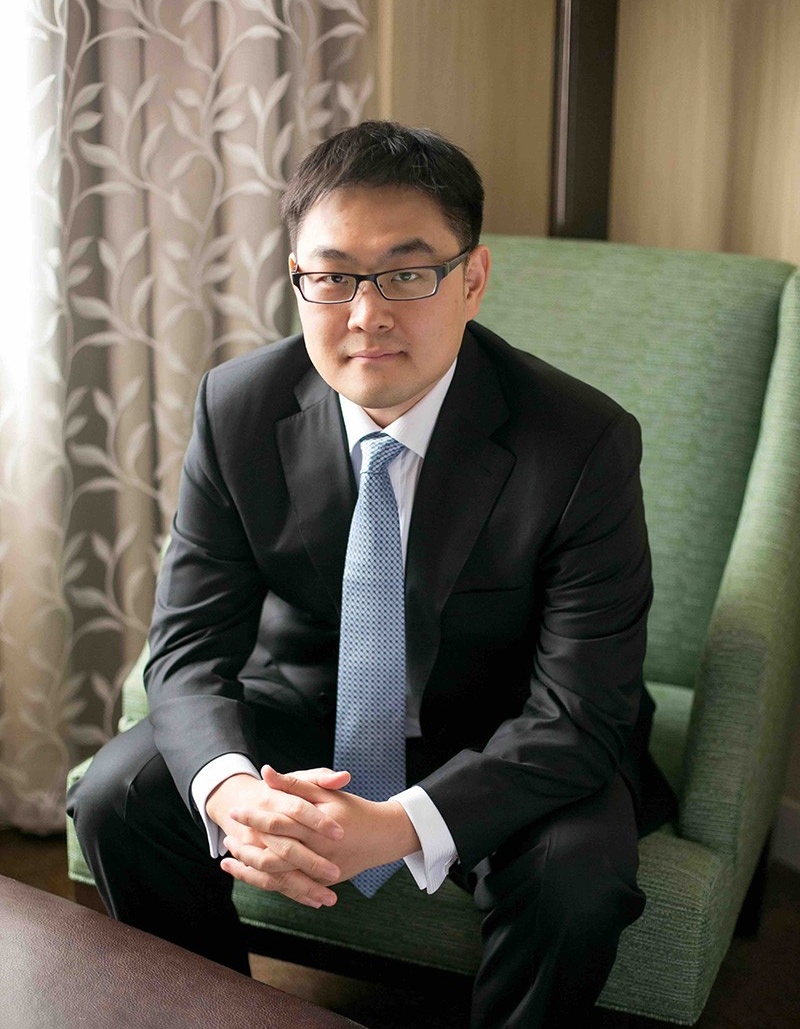
Jason Lee originally enrolled in graduate school to fill a specific gap—his English skills.
Through the law and MBA programs, however, the Korean immigrant gained much more than that, developing both the legal mind and business acumen to succeed in corporate law.
After graduating in 2007 and joining a Wall Street firm, Lee enjoyed a significant early advantage over his peers because of his familiarity with concepts like private equity and EBITDA (a measure of company performance)—so much so that he survived multiple layoffs when the economy tumbled during his first two years as an associate.
“My MBA, especially accounting classes, helped me stand out in that highly competitive field,” Lee says. “I love being ambidextrous in having the skills and decision-making capabilities of two professions.”
Early in his career, Lee noticed how antiquated the process of drafting legal documents could be and began generating ideas for a better solution. At the same time, he also saw the fulfillment his parents found in their own businesses and wanted that experience for himself.
All of this led Lee to launch his own startup in 2015: Celant Innovations, which provides dynamic tools to streamline and automate the document generation process and any related workflow. As CEO, he uses his dual skill sets writing patent applications, preparing financial statements, negotiating contracts and, most importantly, making informed decisions based on multiple perspectives.
“Entrepreneurship is like surviving in the wild—with limited resources, you need to bring order to chaos and will only go as far as your weakest link,” Lee says. “Without a doubt, the hardest challenge was going from zero to one—earning that first dollar with a new product and becoming profitable. But it was also deeply satisfying, and I attribute much of that success to the great education I received at UB.”

Vazquez, center, in Ghana. Photo: Nana Owusua
The Change Maker
Danielle Vazquez, MPH/MBA ’19
Danielle Vazquez is on a mission to lead positive change—in her organization and communities around the globe.
As a child, she envisioned herself becoming a doctor or nurse to fulfill her deep-seated desire to help others. But as an undergrad at UB, she was exposed to the concept of population health—improving outcomes for large groups of people—and changed her trajectory.
“I’ve always worked toward the greater good, but realized that to actually implement change or lead a team, I would need the managerial skills you gain in the MBA program,” says Vazquez, who graduated in May with her MBA and Master of Public Health degrees. “Because of my dual focus, I understand community intervention and research methodologies, as well as how to present and communicate, so business or political leaders will understand how a drug helps patients and invest in it.”
Even as a student, Vazquez was able to use both skill sets for good during the School of Management’s annual experiential learning program in Ghana. Last January, she successfully piloted the Flow Project, a curriculum she created to educate young girls about menstrual health, at a primary school in Accra, the country’s capital. Going forward, Vazquez hopes to expand the curriculum into a nonprofit, with the help of future School of Management cohorts who will teach and collect data at other schools in Ghana.
“Ghana taught me that leadership can be found everywhere,” Vazquez says. “The entire trip—from the cultural experiences to implementing the Flow Project and seeing the results of it—was just amazing and completely different from anywhere I had ever been.”
Only a few months after commencement, the Long Island native is now an administrative fellow at Rush University Medical Center in Chicago, a one-year position where she’ll rotate through several executive departments to broaden her skills and find her niche. Ultimately, she envisions herself becoming a hospital CEO—leading change and helping the community around her.
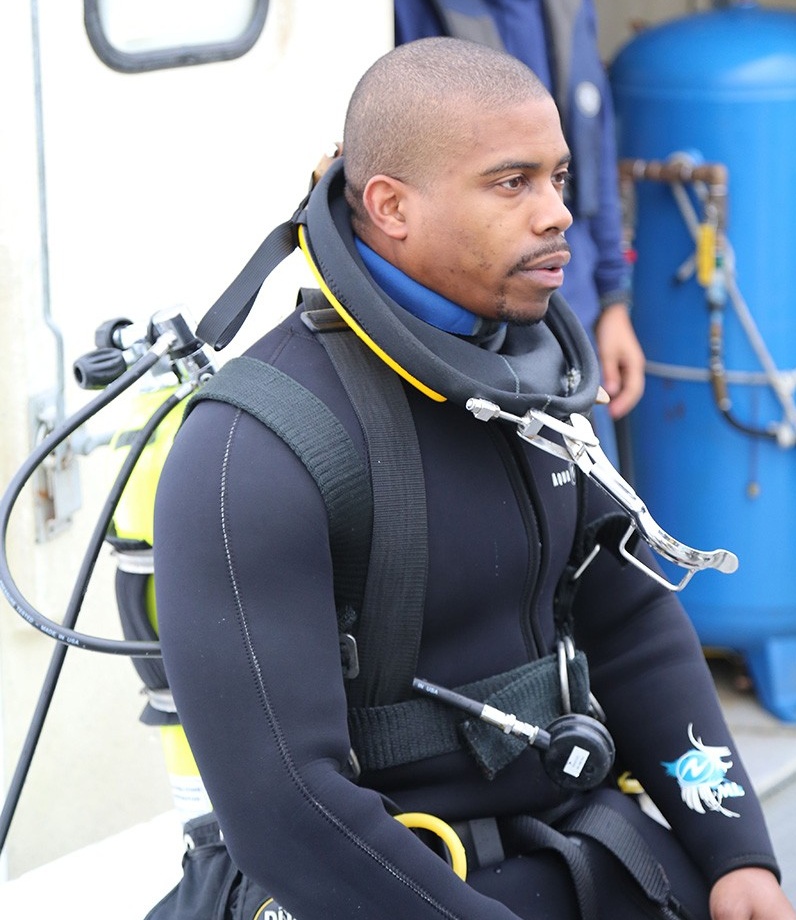
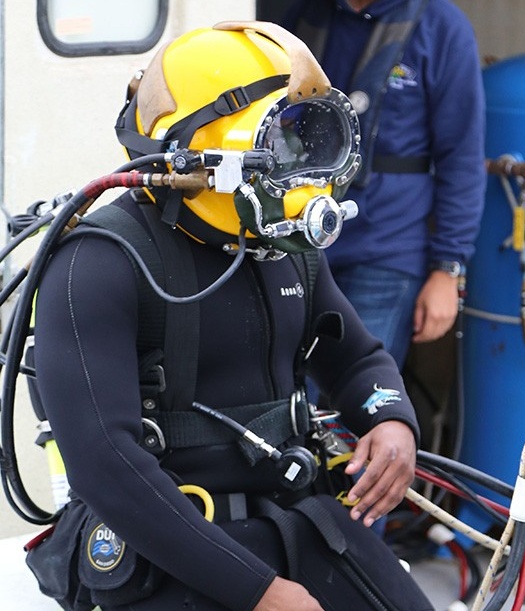
The Diving Doctor
Norman McCulloch Jr., MD/MBA ’07
Every day, Dr. Norman McCulloch Jr. brings together three key aspects of his background: medicine, management—and scuba diving.
Based in Dalton, Ga., McCulloch is the first hyperbaric oxygen therapy specialist in the Hamilton Health Care System. With his clinical partner, he leads the Wound and Hyperbaric Services Department to treat 30-40 patients a day with chronic wounds caused by diabetes, infection, burns and other conditions. Hyperbaric oxygen therapy uses pressurized oxygen to promote healing, essentially simulating the physics of diving underwater.
“This really combines the best of all worlds for me,” says McCulloch, who completed residency at NYU Winthrop Hospital and an undersea and hyperbaric medicine fellowship at SUNY Upstate Medical University. “My aunt went through hyperbaric oxygen therapy while I was in residency, and around the same time, I started scuba diving. I learned about all of the extraordinary and dangerous things that can happen when you’re many feet underwater, and knew this was the specialty I wanted to pursue.”
In addition, as assistant medical director, McCulloch uses the skills he gained in the UB MBA program to lead his staff, implement new strategies, reduce waste and improve efficiency.
“There’s a duality in health care, which I learned early in my career,” McCulloch says. “There’s the clinical side and the business side, and my journey has given me the insights to navigate both to improve measurable outcomes.”
For McCulloch, the most rewarding aspect of his work is the moment when a patient successfully “graduates” from his clinic, when the entire staff lines the hall to clap and celebrate as the patient goes home.
“The MBA program went by in a flash, but the benefit it gave me was invaluable,” he says. “Earning my dual degrees really positioned me well for my career as a physician—and a physician leader in my field.”
The Sales Engineer
Briana Tom, BS/MBA ’17
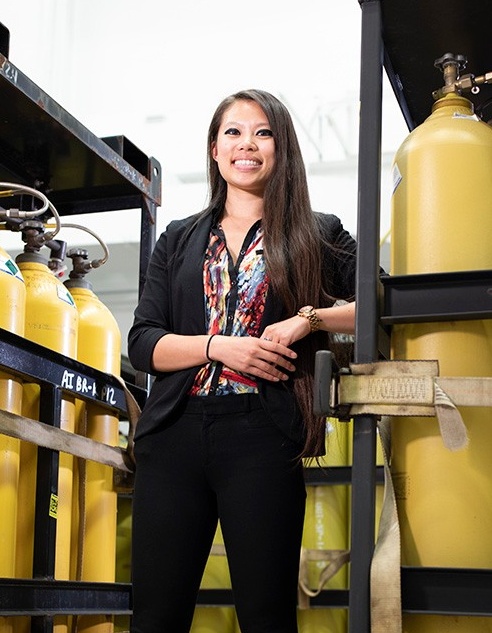
Photo: Tom Wolf
Briana Tom has long been interested in chemistry and the process of transforming raw materials into something people use every day. But rather than focus exclusively on the science, Tom set her sights on a career in engineering management and enrolled in UB’s five-year BS Chemical Engineering/MBA program.
“With engineering, I gained the technical background to understand heating points and chemical reactions,” Tom says. “And with the business side, I’m able to take that technical knowledge and talk with high-level managers about how to solve their problems.”
As an inside sales engineer at Harper International Corp., Tom cultivates opportunities for her company, a global leader in complete thermal processing solutions. In a typical week, she works with clients that range from startups and laboratories to commercial enterprises, and span five sectors: carbon fiber, advanced ceramics, battery materials, nuclear fuel and aerospace. In every interaction, Tom combines the networking and presentation skills she gained in the School of Management with the deep knowledge she learned from her engineering courses.
“When I’m meeting with clients, it’s important to reach both the engineers, who will actually use the machines, and the company presidents and CEOs, who may not know the technical details but want to discuss their timeline and budget for capacity expansion,” Tom says.
Tom hopes to eventually move into a vice president role for sales and marketing—and expects the value of her dual degrees will only grow in the future.
“The communications and strategy courses were really helpful from the MBA program,” Tom says. “As a team, when we’re having strategy sessions for our goals for the next fiscal year, I’m able to say, ‘We’re not using these markets properly,’ and have a voice at the table. As I get further in my career, those skills will help even more.”
Stand apart—and above
Driven by industry demand, the School of Management has increased its array of dual, collaborative and combined MBA programs to 19.
Combined Graduate and MBA Programs
• Accelerated MBA for Medical Residents/Fellows
• MD/MBA
• PharmD/MBA
• DDS/MBA
• Doctor of Audiology/MBA
• JD/MBA
• Master of Public Health/MBA
• Master of Social Work/MBA
• Master of Education/MBA
• Master of Architecture/MBA
• MS Real Estate Development/MBA
Combined Undergraduate and MBA Programs
• BS Business Administration/MBA
• BS Biomedical Engineering/MBA
• BS Chemical Engineering/MBA
• BS Civil Engineering/MBA
• BS Computer Science/MBA
• BS Electrical Engineering/MBA
• BS Industrial Engineering/MBA
• BS Mechanical Engineering/MBA